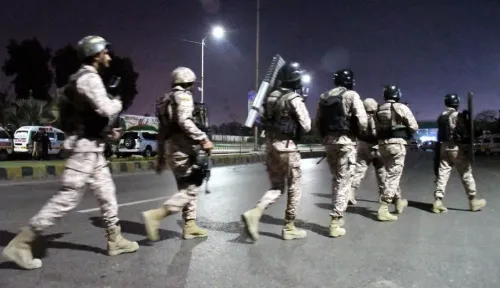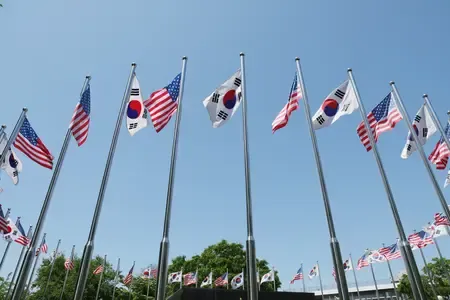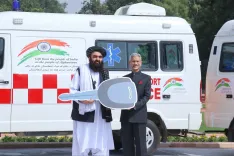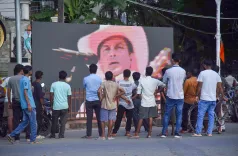Global Charity Urges Increased Aid for Displaced Sudanese Civilians in South Sudan
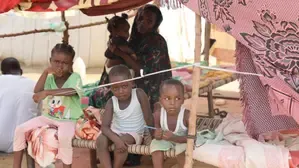
Juba, Dec 23 (NationPress) The global medical charity Medecins Sans Frontieres (MSF) has urgently called for humanitarian assistance for displaced Sudanese civilians fleeing to neighboring South Sudan.
On Sunday, MSF reported that in recent weeks, the number of newly displaced individuals has exceeded 80,000, with many suffering from war injuries as the conflict in Sudan escalates, according to Xinhua news agency.
Emanuele Montobbio, MSF's emergency coordinator in Renk County of Upper Nile State, a primary entry point for the displaced, stated that since early December, more than 5,000 individuals have crossed into the country daily due to escalating violence near the border in Sudan's White Nile and Sennar states.
Montobbio emphasized that MSF is enhancing its response to the humanitarian crisis in Renk and surrounding informal settlements, indicating that the surge of people in the area has overwhelmed already limited resources, placing the displaced individuals in critical conditions.
"We have set up 14 tents around the hospital to accommodate war-wounded patients arriving at Renk County Hospital, as there is no additional space for tents in the vicinity, while patients and their families continue to arrive," Montobbio conveyed in a statement from Juba, the capital of South Sudan.
He noted that MSF is collaborating with the International Committee of the Red Cross (ICRC) to treat war-injured patients and manage the increasing influx of critical cases, including pre-and post-operative care, but acknowledged that the situation is overwhelmingly severe and insufficient.
"In recent weeks, only a few dozen individuals have received surgical interventions and tetanus vaccinations, while over 100 wounded patients, many with critical injuries, are still awaiting surgery," he explained.
Roselyn Morales, MSF's deputy medical coordinator in South Sudan, highlighted that outside the transit centers in Renk and in informal settlements, thousands are compelled to live under trees or in temporary shelters, with restricted access to food, clean water, healthcare, and other essential services.
"We urgently appeal to both the South Sudanese authorities and international organizations to swiftly increase their response in Renk and beyond, ensuring that the essential and life-saving needs of the affected population are met without delay," she stressed.
MSF reported that two transit centers in Renk, designed for a maximum of 8,000 people, are currently housing over 17,000. While most returnees and refugees initially entered South Sudan through the official Joda border crossing, a growing number are now using informal routes to the east of Renk, where more than 82,000 new arrivals have been documented in areas such as Joda, Duku Duku, Jerbana, Shemmedi, Gosfami, and Atam.
Alhida Hammed, a wounded displaced individual from Blue Nile State in Sudan receiving treatment at the MSF facility in Renk, shared the harrowing conditions back home.
"The houses were burning, and everyone was fleeing in different directions. We have been displaced and now live under a tree; I have no desire to return home. Home is no longer a sanctuary; it is filled with painful memories," she lamented.
Bashir Ismail from Mosmon in Blue Nile described the devastation he observed from airstrikes in his region.
"I used to only hear about air raids, but recently, it became a reality. I was at the market purchasing items when the bombing commenced, and something struck me in the chest. It was the most excruciating experience of my life; I was so disoriented that it felt as if I had lost my memory. The next thing I knew, I was at Renk County Hospital," he recounted.
MSF stated that it is deploying mobile clinics to provide primary healthcare in informal settlements in Gosfami, Atam, Jerbana, and Joda, where displaced individuals are concentrated. On December 17 alone, MSF teams conducted over 250 medical consultations in Gosfami and referred critically ill individuals to Renk County Hospital. MSF is also initiating activities to address the urgent need for water and sanitation in Atam and Jerbana.
Moreover, relief supplies have been distributed to these areas for 2,500 displaced families. Despite these efforts, the response remains inadequate due to the lack of other humanitarian organizations in these informal settlements, leading to significant support gaps for the displaced population, according to MSF.

